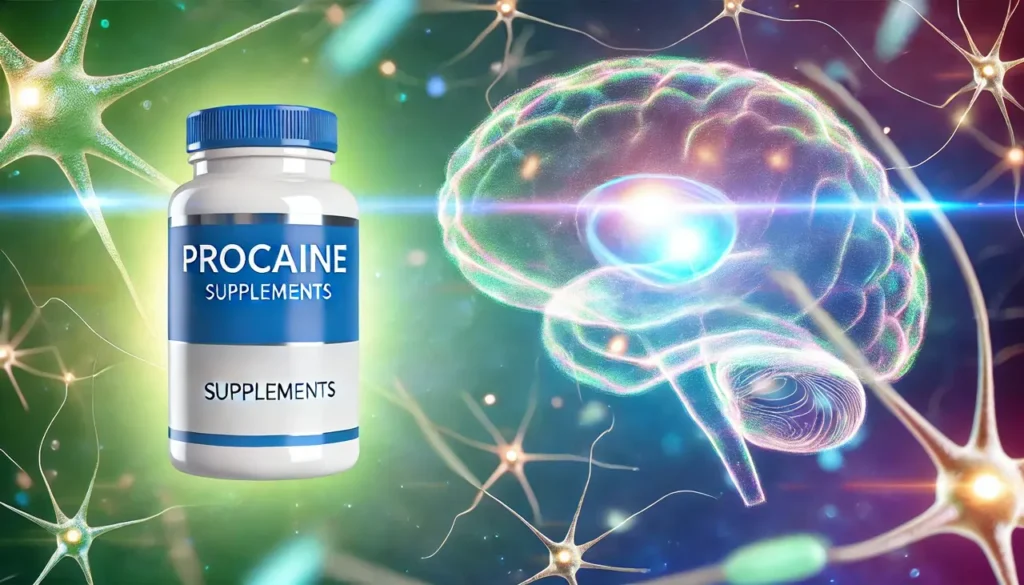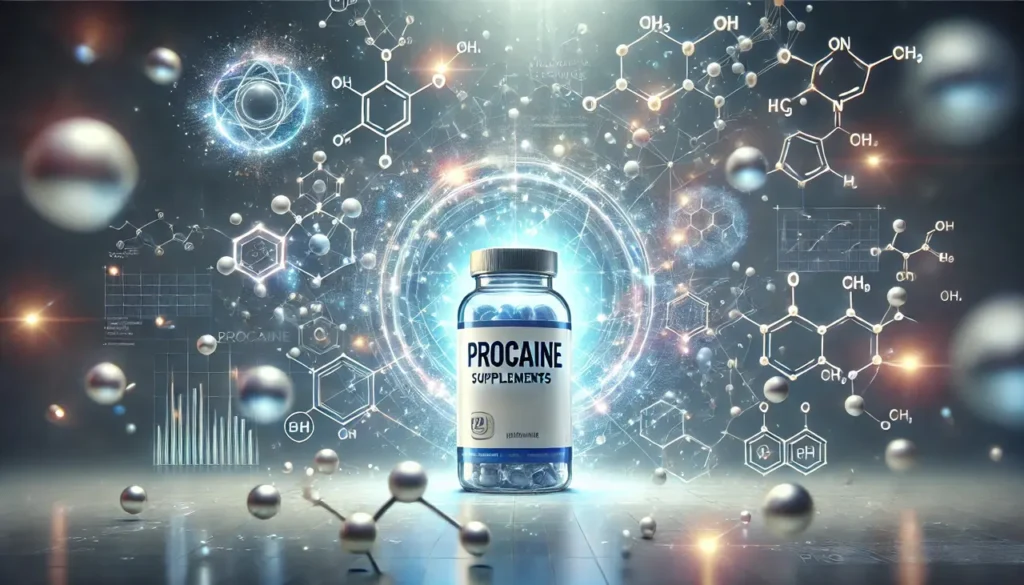Procaine, commonly known as Novocain, is a local anesthetic that has been utilized in various medical and dental procedures for decades. Beyond its anesthetic properties, procaine has garnered attention for its potential nootropic benefits, primarily due to its effects on cognitive function, neuroprotection, and overall brain health. This article delves into the chemistry, physiological mechanisms, nootropic potential, dosing guidelines, safety profile, and interactions of procaine, providing a comprehensive overview for those considering its use as a nootropic supplement.
You May Also Like:
Sources of Procaine
Procaine is synthetically produced and does not occur naturally in food sources. It was developed in the early 20th century as a safer alternative to cocaine for local anesthesia. Procaine’s synthesis involves combining p-aminobenzoic acid with diethylaminoethanol, resulting in a compound that can block nerve signals. While it is primarily available in injectable forms, procaine can also be found in topical preparations and compounded formulations for specific medical applications.
Despite its synthetic origins, procaine has been of interest in the context of supplementation, particularly for its proposed cognitive benefits. Some alternative health practitioners suggest that procaine may enhance brain function and overall cognitive performance, prompting further investigation into its nootropic properties.

Chemistry of Procaine
The chemical structure of procaine is derived from the amino ester class of compounds. Its molecular formula is C_13H_18N_2O_2, and its systematic name is ethyl p-aminobenzoate. Procaine consists of a p-aminobenzoic acid (PABA) moiety linked to an ethyl group, contributing to its anesthetic properties.
Procaine acts as a competitive inhibitor of sodium channels, thereby blocking nerve conduction. When administered, it interferes with the transmission of pain signals by preventing the influx of sodium ions into neurons, effectively numbing the area surrounding the injection site. This mechanism is crucial in its role as a local anesthetic, but it also raises questions about its potential impacts on brain function when considered as a nootropic.

Physiological Mechanisms of Procaine in the Body and Brain
Procaine’s primary physiological mechanism involves its local anesthetic action, but its effects on the central nervous system (CNS) may extend beyond mere pain relief. Research indicates that procaine can influence various neurotransmitter systems, including dopamine and acetylcholine, both of which are vital for cognitive function and memory.
Neurotransmitter Modulation
Procaine has been observed to modulate neurotransmitter release in the brain. Specifically, it has been suggested that procaine may increase the availability of acetylcholine, a key neurotransmitter involved in learning and memory processes. By enhancing acetylcholine activity, procaine could potentially support cognitive functions such as attention, memory retention, and overall mental clarity.
Additionally, procaine’s influence on dopamine pathways may contribute to its nootropic effects. Dopamine is essential for mood regulation, motivation, and reward processing. By modulating dopamine levels, procaine may improve mood and cognitive performance, particularly in individuals experiencing cognitive fatigue or mood disturbances.
Neuroprotection and Anti-Inflammatory Effects
Procaine has demonstrated potential neuroprotective properties, which may further enhance its appeal as a nootropic. Research suggests that procaine could reduce oxidative stress and inflammation in neuronal tissues. These effects are particularly relevant in the context of neurodegenerative diseases, where inflammation and oxidative damage contribute to cognitive decline.
By mitigating oxidative stress, procaine may help protect neurons from damage, thereby preserving cognitive function over time. This neuroprotective capacity could be especially beneficial for individuals at risk of neurodegenerative disorders or those seeking to maintain cognitive health as they age.
Achieve Fuller, Healthier Hair with Supplements for Growth and Strength—Shop Amazon’s Top Picks!

Nootropic Benefits of Procaine
Given its pharmacological properties and physiological mechanisms, procaine presents several potential nootropic benefits worth exploring.
1. Enhanced Cognitive Performance
Procaine’s ability to modulate neurotransmitter activity, particularly acetylcholine and dopamine, positions it as a candidate for enhancing cognitive performance. Individuals seeking improved focus, memory retention, and overall cognitive clarity may benefit from procaine supplementation. Its impact on acetylcholine levels could facilitate more efficient information processing, potentially leading to enhanced learning and retention of new information.
2. Mood Enhancement and Stress Reduction
The influence of procaine on dopamine pathways may also confer mood-enhancing effects. Improved dopamine signaling is associated with better mood regulation and increased motivation. For individuals experiencing stress or cognitive fatigue, procaine may help alleviate symptoms of anxiety and improve overall emotional well-being, making it an attractive option for those seeking cognitive enhancement in high-stress environments.
3. Neuroprotective Effects
Procaine’s potential neuroprotective effects, particularly its ability to combat oxidative stress and inflammation, make it relevant for individuals concerned about cognitive decline. By protecting neurons from damage, procaine may contribute to long-term cognitive health and reduce the risk of neurodegenerative diseases such as Alzheimer’s and Parkinson’s.
4. Pain Relief and Cognitive Focus
While procaine is primarily recognized for its anesthetic properties, its use in pain management could indirectly support cognitive performance. By alleviating discomfort, procaine may enhance focus and concentration, allowing individuals to engage in cognitive tasks without the distraction of pain. This benefit is particularly relevant for those experiencing chronic pain conditions, where pain may significantly impair cognitive function.

Dosage and Supplementation Guidelines
Determining an appropriate dosage for procaine supplementation requires careful consideration of individual factors, including overall health, specific goals, and any existing medical conditions. Due to its status as a prescription medication, procaine should only be used under the guidance of a qualified healthcare professional.
Recommended Dosage
- General Use: For general cognitive enhancement, a low dose of procaine (10-25 mg) may be sufficient to experience its potential benefits without significant risks of side effects. Individuals considering procaine as a nootropic should start at the lower end of the dosing range and adjust as necessary under medical supervision.
- Therapeutic Use: In therapeutic settings, higher doses may be prescribed for specific medical indications, such as pain management or local anesthesia. These doses can range from 50 mg to 200 mg, depending on the specific application and patient needs.
- Administration Forms: Procaine is typically administered via injection, but compounded formulations for oral use may be available through specialized practitioners. Individuals should be cautious and ensure that any compounded forms are obtained from reputable sources.

Considerations for Supplementation
- Individual Factors: Factors such as age, weight, and overall health can influence the appropriate dosage of procaine. It is essential to consult with a healthcare provider to determine the most suitable dosing regimen for individual needs.
- Monitoring: Regular monitoring by a healthcare professional is recommended when using procaine, particularly for individuals with pre-existing health conditions or those taking other medications.
- Avoiding High Doses: Excessive doses of procaine can lead to adverse effects, including nervous system toxicity. Individuals should be cautious not to exceed recommended dosages and should prioritize safety.
Side Effects and Safety
Procaine is generally considered safe when used appropriately under medical supervision. However, like any supplement or medication, it may cause side effects, particularly at higher doses or in individuals with specific sensitivities.
Common Side Effects
- Injection Site Reactions: When administered as an injection, procaine may cause localized reactions, including redness, swelling, or pain at the injection site. These reactions are typically mild and resolve quickly.
- Central Nervous System (CNS) Effects: High doses of procaine may lead to CNS-related side effects, including dizziness, headache, or confusion. Individuals experiencing these symptoms should seek medical attention promptly.
- Allergic Reactions: Though rare, some individuals may experience allergic reactions to procaine, which can manifest as rash, itching, or swelling. Anyone with a known allergy to similar local anesthetics should avoid procaine.
Safety Considerations
- Pregnancy and Breastfeeding: The safety of procaine during pregnancy and breastfeeding has not been established. Pregnant or nursing individuals should avoid procaine supplementation unless prescribed by a healthcare provider.
- Pre-existing Conditions: Individuals with certain health conditions, particularly those affecting the cardiovascular or nervous systems, should use procaine with caution. A thorough assessment by a healthcare professional is essential to evaluate the safety of procaine use in these populations.
Interactions with Other Supplements and Medications
Understanding potential interactions is crucial for ensuring the safe use of procaine, particularly when combined with other supplements or medications.
1. Antidepressants and Mood Stabilizers
Procaine may interact with certain antidepressants or mood stabilizers, potentially enhancing or diminishing their effects. Individuals taking these medications should consult their healthcare provider before adding procaine to their regimen.
2. CNS Depressants
Combining procaine with other CNS depressants, such as benzodiazepines or opioids, may lead to increased sedation or respiratory depression. Caution is advised, and individuals should avoid using these substances concurrently without medical supervision.
3. Blood Pressure Medications
Procaine could influence cardiovascular function, potentially affecting blood pressure. Individuals taking antihypertensive medications should monitor their blood pressure closely when using procaine, as adjustments to medication doses may be necessary.
4. Other Nootropics
Procaine may be safely combined with other nootropic supplements; however, individuals should exercise caution and consult a healthcare provider to prevent overstimulation or adverse interactions. Monitoring for any side effects is essential when combining nootropics with procaine.
Risks for Individuals with Certain Health Conditions
Procaine may pose additional risks for individuals with specific health conditions, warranting careful consideration before use.
1. Cardiovascular Disorders
Individuals with cardiovascular disorders, such as hypertension or arrhythmias, should exercise caution when using procaine. Its potential effects on blood pressure and heart rate necessitate thorough evaluation and monitoring by a healthcare professional.
2. Neurological Conditions
Those with neurological conditions, such as epilepsy or multiple sclerosis, may be at increased risk for adverse effects from procaine. Consultation with a healthcare provider is critical for determining the safety and appropriateness of procaine use in these cases.
3. Allergies to Local Anesthetics
Individuals with known allergies to local anesthetics, particularly ester-type anesthetics like procaine, should avoid its use. Alternative nootropic options should be explored to prevent allergic reactions.
Top Stress Relief and Anxiety Supplements to Promote Relaxation and Calm—Available on Amazon!

Procaine’s Potential as a Nootropic
Procaine, with its origins as a local anesthetic, presents potential nootropic benefits that merit consideration. Its ability to modulate neurotransmitter activity, provide neuroprotection, and alleviate pain offers exciting prospects for individuals seeking cognitive enhancement. However, caution is warranted due to its side effects, potential interactions, and the necessity for medical supervision when used as a supplement.
While research on procaine’s nootropic effects is still emerging, its established pharmacological properties and physiological mechanisms provide a foundation for understanding its potential applications in cognitive enhancement. As with any supplement, individuals interested in procaine should consult with a qualified healthcare provider to evaluate its suitability for their specific needs and health conditions.In summary, procaine’s unique profile as a local anesthetic and its potential cognitive benefits make it a compelling candidate for those exploring nootropic supplements. However, responsible use and professional guidance are essential for maximizing its benefits while minimizing risks.

References:
- Procaine–The Controversial Geroprotector Candidate: New Insights Regarding Its Molecular and Cellular Effects. Retrieved from: https://pmc.ncbi.nlm.nih.gov/articles/PMC8349289/
- The Systemic Use of Procaine in the Treatment of the Elderly: A Review. Retrieved from: https://agsjournals.onlinelibrary.wiley.com/doi/abs/10.1111/j.1532-5415.1977.tb00917.x
- Procaine Therapy in Old Age and other Disorders (Novocaine Factor H3) . Retrieved from: https://karger.com/gec/article-abstract/2/3/148/144742/Procaine-Therapy-in-Old-Age-and-other-Disorders?redirectedFrom=PDF
Important Note: The information contained in this article is for general informational purposes only, and should not be construed as health or medical advice, nor is it intended to diagnose, prevent, treat, or cure any disease or health condition. Before embarking on any diet, fitness regimen, or program of nutritional supplementation, it is advisable to consult your healthcare professional in order to determine its safety and probable efficacy in terms of your individual state of health.
Regarding Nutritional Supplements Or Other Non-Prescription Health Products: If any nutritional supplements or other non-prescription health products are mentioned in the foregoing article, any claims or statements made about them have not been evaluated by the U.S. Food and Drug Administration, and such nutritional supplements or other health products are not intended to diagnose, treat, cure, or prevent any disease.


